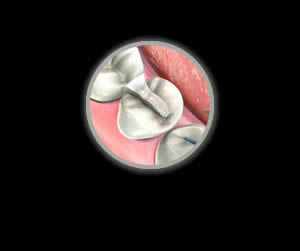Inlays are custom fit fillings made in a laboratory. First, the decay is cleaned from your tooth and then an impression of the tooth is made and sent to the lab. In the interim a temporary filling is used to fill in the space and protect your tooth from fracture or further deterioration.
There are several types of materials to fabricate an inlay. Which are porcelain and composite inlays.
The first type of inlay is a porcelain inlay, which is colored to match your tooth. In addition to being aesthetically pleasing the other benefits of porcelain inlays are that they are also quite stain resistant and hard.
The second type of inlay is made of tooth colored composites. Like the porcelain inlays, composite inlays are also very aesthetically pleasing. Both types of inlays are bonded or glued to your teeth with special cements.
Porcelain Inlay & Composite Inlay Post Treatment Expectation
Following the inlay treatment it is very common to experience some discomfort, normally at the site of the anesthetic or at the tooth itself. To alleviate the discomfort you can follow your dentist recommendation on taking an over the counter pain medication such as Advil. If your symptoms persist for more than few days, you should visit your dentist.
In some cases and due to variety of reasons your inlay could become loose. In this case you should contact or visit your dentist.
Please keep in mind the longevity of a filling depends in large part on your oral hygiene and diet. Be sure to maintain your filling with proper brushing and flossing.
If you have any additional questions, please consult with the dentist.





